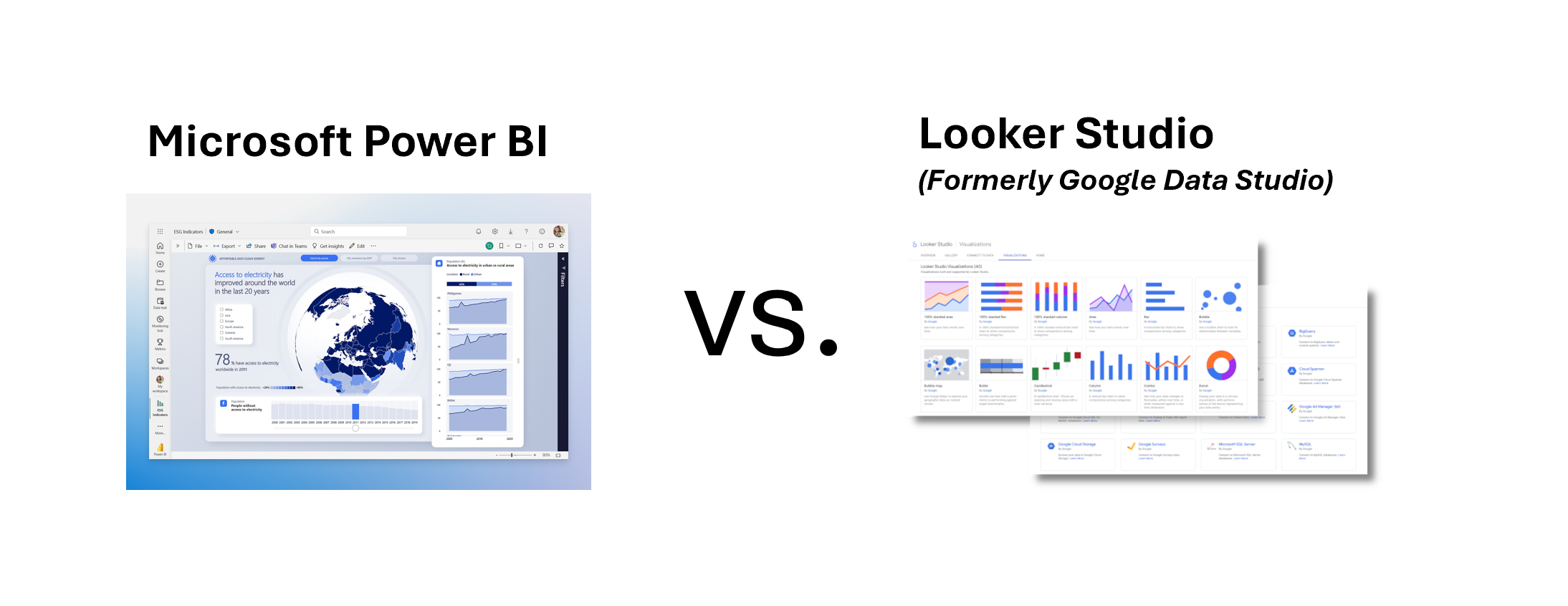From Our Experience: Choosing the Right Tool for Your Data Analytics Needs

As a data driven firm that has worked with businesses of different sizes and industries to utilize their data, one of the most common questions we initially hear is, “Should I use Power BI or Looker Studio?”
The answer depends on your business needs, resources, and goals. Here's how we approach this decision based on our experience.
What Is Power BI?
Microsoft Power BI is a business analytics tool designed to connect, transform, and visualize data from various sources. It’s a powerful, scalable solution that integrates seamlessly with the Microsoft ecosystem, offering advanced capabilities for businesses with complex data needs.
From our work with clients, we’ve found Power BI particularly effective when:
- Businesses require advanced data modeling or analytics.
- There’s a need to combine multiple data sources (e.g., ERP systems, CRMs, and databases).
- Teams want to go beyond static dashboards to leverage predictive analytics and AI.
What Is Looker Studio?
Looker Studio (LS) (formerly kown as Google Data Studio) is a free, lightweight tool that makes it easy to create visually appealing dashboards and reports. It’s ideal for organizations already using the Google ecosystem, such as Google Analytics, Ads, and BigQuery.
Our experience shows that LS works well for:
- Marketing teams focused on campaign performance.
- Businesses with simpler reporting needs.
- Clients looking for a cost-effective entry into data visualization.
How We Decide: Power BI vs. Google Data Studio
When working with clients, we consider the following factors to recommend the best tool:
1. Data Complexity
- Power BI: Best for handling large, complex datasets that require advanced modeling or calculations.
- LS: Ideal for simpler datasets, especially those primarily from Google products.
2. Integration Needs
- Power BI: Integrates with over 140 platforms, making it a great choice for businesses with diverse systems (e.g., Salesforce, SQL Server).
- LS: Works best with Google tools, with limited connectors for other platforms.
3. Budget Constraints
- Power BI: Offers a free version, but advanced features require a Pro or Premium license.
- LS: Completely free, making it a great starting point for budget-conscious teams.
4. Team Expertise
- Power BI: Requires some training, and potentially trained business analysts, to unlock its full potential.
- LS: User-friendly and intuitive, even for beginners.
5. Long-Term Goals
- Power BI: Great for businesses looking to scale their analytics capabilities over time.
- LS: Great for short-term or straightforward reporting needs.
How Smartt Can Help You Decide
Choosing between Power BI and Looker Studio isn’t about which tool is “better”—it’s about finding the one that fits your **specific business needs**. But in general…
Choose Power BI when you want to:
- Integrate multiple data sources for a unified view.
- Leverage advanced features like machine learning and real-time data updates.
- Scale analytics across departments or entire organizations.
Choose Looker Studio when you want to:
- Integrate Google products and other products that LS supports.
- Do some free low-risk experimentation.
- Create quick dashboards for stakeholders that they can access through links without downloading any software.
Ready to Unlock the Power of Your Data?
At Smartt, we bring real-world expertise to every data analytics project. Whether you’re just starting with Looker Studio or ready to scale with Power BI, we’re here to help you make the right choice and turn your data into actionable insights.
Contact us today to get started with a solution that works for you.


